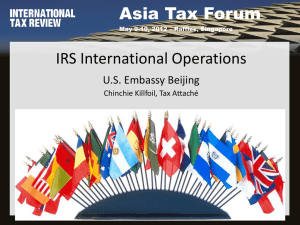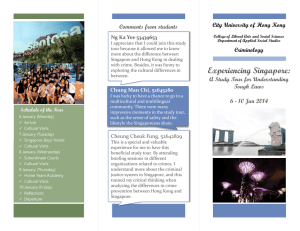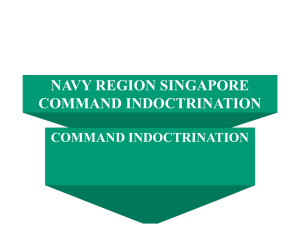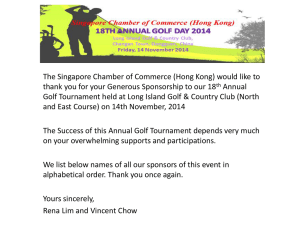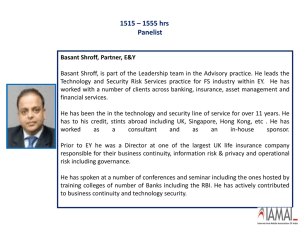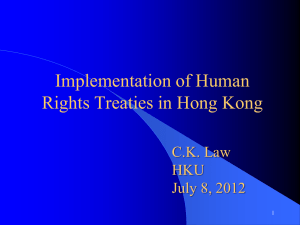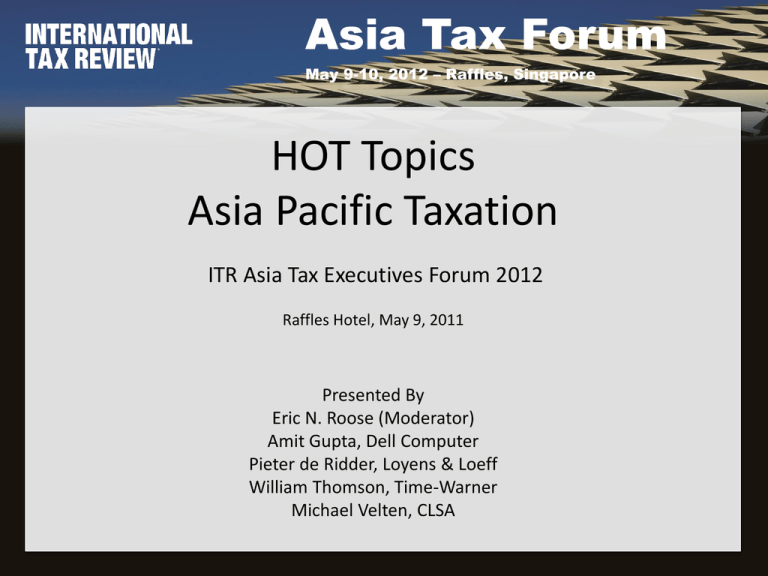
Asia Tax Forum
May 9-10, 2012 – Raffles, Singapore
HOT Topics
Asia Pacific Taxation
ITR Asia Tax Executives Forum 2012
Raffles Hotel, May 9, 2011
Presented By
Eric N. Roose (Moderator)
Amit Gupta, Dell Computer
Pieter de Ridder, Loyens & Loeff
William Thomson, Time-Warner
Michael Velten, CLSA
Asia Tax Forum
May 9-10, 2012 – Raffles, Singapore
2012 Asia Pacific Tax Environnent
• The tax environment in Asia Pacific continues to be changing rapidly
and increasingly becoming more complex and challenging
• New tax rules/regulations continue to be introduced
- with little or no prior notice
- so broad in reach as to be uncertain in their application
- increasingly against international norms
- and often with retroactive effect
• Increased tax compliance obligations in TP and documentaion
• Tighter increased tax reviews and more aggresive enforcement of
the tax rules/regulations
Asia Tax Forum
May 9-10, 2012 – Raffles, Singapore
HOT TAX TOPICS – Asia Pacific
• Indirect Share Transfers
• Beneficial Ownership Challenges
• General Anti-Abuse Rules (GAAR)
• Transfer Pricing Challenges
• Hong Kong Fund versus Singapore Fund – Comparison
Asia Tax Forum
May 9-10, 2012 – Raffles, Singapore
Indirect Share Transfers
• India
• China
• South Korea
• Indonesia
Asia Tax Forum
May 9-10, 2012 – Raffles, Singapore
India- Indirect Share Transfer
• Vodafone Decision
• GOI Response
• Implications for Future
Asia Tax Forum
May 9-10, 2012 – Raffles, Singapore
.
Vodafone Transaction
Hutchison Telecom
International Limited
Cayman Island
Intermediate BVI
Companies
GDP India Inv.
Cayman Island
Intermediate
Mauritius/Indian
Companies
Indian Telecom
Target Company
Purchase Sale K
USD $11.1
Billion
Vodafone International
Holdings BV
Netherlands
Asia Tax Forum
May 9-10, 2012 – Raffles, Singapore
Revenue’s Case
• Vodafone in substance purchased the Indian business of
Hutchinson. Therefore, Vodafone, as the purchaser of an
Indian business should have withheld tax
• Arguments:
– Sale of GDP Cayman was a tax avoidance scheme
– Court must look at substance as a whole (which was a sale
of an Indian business) and not the form of the transaction
Asia Tax Forum
May 9-10, 2012 – Raffles, Singapore
Supreme Court’s Decision
• Transaction was not a sham
• Revenue cannot disregard form of the transaction
• Substance of the transaction was the transfer of shares of a
Cayman Islands company and there was no transfer of rights
or entitlements in India
• There is no provision in the Indian tax law to tax transfers of
shares in a Cayman Islands company
• Therefore, Revenue has no right to impose withholding tax on
Vodafone
Asia Tax Forum
May 9-10, 2012 – Raffles, Singapore
Principles Derived from Decision
• Revenue must view foreign investment transactions as a
whole and not look-through or dissect them into elements
• The form of a transaction can only be disregarded if it is a
sham-transaction or tax-avoidance transaction
Asia Tax Forum
May 9-10, 2012 – Raffles, Singapore
Principles Derived from Decision
• Relevant Factors in Determining the True Legal Nature of a
Transaction
– Duration of Holding Structure – since 1994
– Period of Business Operation – long term
– Generation of Taxable Revenues in India - yes
– Continuity of Business on Exit – yes, by Vodafone
Asia Tax Forum
May 9-10, 2012 – Raffles, Singapore
GOI Response
• Revenue filed petition to ask the Supreme
Court to review its own decision. The appeal
was summarily dismissed
• 2012 India Budget
–Indirect transfer provisions
–General Anti-Avoidance Rule (“GAAR”)
–Withholding Tax Provisions
Asia Tax Forum
May 9-10, 2012 – Raffles, Singapore
Budget: Indirect Transfer Provisions
• Budget Proposal to Levy Tax on Indirect Transfers
Key Changes in Budget
– Definition of Capital Asset expanded to include “rights
to manage and control”
– Definition of Transfer covers “any interest” in any
asset in any manner
– Scope of income is deemed to accrue/arise in India
“through” transfer of assets situated in India
• Retroactive, with effect from April 1, 1962
Asia Tax Forum
May 9-10, 2012 – Raffles, Singapore
China- Indirect Share Transfers
•
•
•
•
Indirect Transfer Circular 698
Indirect Transfer Cases
Panel Discussion
Tax Planning
Asia Tax Forum
May 9-10, 2012 – Raffles, Singapore
Circular 698 – Indirect Equity/Share Transfers
Before
A
After
Sell
•
Circular 698 effective date: January 1, 2008
•
A may have to report the transaction,
depending on the tax profile of B or profile of
B’s jurisdiction
•
B’s Jurisdiction/B’s Tax Profile?
- effective tax rate not more than 12.5%
- foreign income not subject to tax
•
B may be disregarded
•
Transaction treated as a transfer of PRC Co
subject to Chinese tax
C
B
B
PRC Co
PRC Co
Asia Tax Forum
May 9-10, 2012 – Raffles, Singapore
Recent China Enforcement Cases
•
•
•
•
Jiangdu 2010 – Classic Case
Shenzhen 2010 – Transfer by a Foreign Individual
Shantou 2011 – Internal Reorganization Transfer
Guiyang 2011 - Transfer of Intermediate
Company Respected for Treaty Purposes
• Ningbo 2011 – Transfer to Chinese JV Partner
• Kunshan 2011 – Transfer to Foreign JV Partner
• Qidong 2012 – Public Company Transfer to Public
Company
Asia Tax Forum
May 9-10, 2012 – Raffles, Singapore
Jiangdu 2010 - Classic Indirect Transfer
T Co. was established in Jiangdu and jointly owned
Before Transaction
Foreign Country
S Co.
by a Hong Kong company (“H Co.”) and a Chinese
100%
resident company. H Co. holds a 49% equity
interest in T Co.
Hong Kong
Mainland
China
H Co. is a wholly-owned subsidiary of a foreign
H Co.
company (“S Co.”) that is ultimately owned by a well
49%
know US private equity fund
On January 14, 2010, S Co. transferred all its equity
T Co.
interest in H Co. to another foreign company (“B
Co.”), which is in turn owned by a company in the
After Transaction
B Co.
Foreign Country
Hong Kong
Mainland
China
U.S.
100%
The tax authorities in Jiangdu discovered the deal
through public channels, requested the relevant
transfer documents and concluded that H Co.
H Co.
should be disregarded due to lack of substance
under Circular 698
49%
T Co.
The tax authorities made a tax assessment of RMB
173 million and on May 18, 2010, the tax was paid
by S Co.
Asia Tax Forum
May 9-10, 2012 – Raffles, Singapore
Shenzhen 2010 – Indirect Transfer by
a Foreign Individual
Before Transfer
Individu
al
H Co. was established by a Hong Kong individual with a
capital injection of HKD 10,000
100%
Hong Kong
Mainland China
H Co.
In 2000, H Co. set up T Co. in Shenzhen. T Co. is engaged
in the logistics business and owns a number of warehousing
facilities
After a 10-year operation, T Co. had become a very
T Co.
successful company with greatly appreciated real properties
In 2010, the Hong Kong individual transferred 100% equity in
H Co. to B Co., which is a unrelated Singapore company, for
After Transfer
B Co.
Singapore
The Shenzhen tax authorities deemed the transfer to be the
transfer of T Co.
H Co.
Hong Kong
Mainland China
a consideration of more than RMB 200 million
The RMB17.7 million tax was paid recently
This is the first case involving the taxation of indirect transfer
by a foreign individual
T Co.
Interesting question: Should the tax rate be 10% or 20%?
17
Asia Tax Forum
May 9-10, 2012 – Raffles, Singapore
Shantou 2011 – Internal Indirect Transfer
Before Transfer
Foreign
Country
T Co. was established in Shantou in June 2004 and
After Transfer
P Co.
acquired by G Co. in February 2008
After a series of share transfers, T Co. was indirectly
P Co.
Hong
Kong
held by P Co. through A Co., AA Co., AAA Co. and G
Co.
H Co.
Both AA Co. and AAA Co. were set up in BVI in July
100%
W Co.
A Co.
100%
100%
Hong
Kong
Mainland
China
AAA Co.
AAA Co.
100%
G Co.
G Co.
controlling shareholder of which is P Co.
W Co. paid the purchase price of RMB 80 million
100%
In November 2010, the Shantou tax authorities
learned about the transaction through the internet
In February 2011, the Shantou tax authorities ruled
100%
T Co.
which is a wholly owned subsidiary of H Co.
H Co. is a Hong Kong listed company, the major and
100%
100%
BVI
In November 2010, A Co. transferred AA Co. to W Co.,
AA Co.
AA Co.
2009
T Co.
100%
that the transfer should be deemed to be the transfer
of the T Co.
In March 2011, the RMB7.2 million tax was paid
18
Asia Tax Forum
May 9-10, 2012 – Raffles, Singapore
Guiyang 2011 – Indirect Transfer
BVI Co. was established by a Hong Kong
Company
Before Transfer
HK Seller
BVI Co set up a Hong Kong branch and received a
HK Certificate of Tax Residency in 2009
100%
Offshore
Mainland China
BVI Co.
T Co.
HK
Branch
T Co dividends enjoyed a reduced dividend
withholding tax under the Hong Kong - Mainland
PRC DTA
In 2010, the Hong Kong Company transferred 100%
equity in BVI Co. to B Co.
The Guiyang tax authorities deemed the transfer to
After Transfer
Singapore
B Co.
be the transfer of T Co. claiming BVI Co was just a
shell company
WHT of RMB31.5 million tax was paid
H Co.
Hong Kong
Mainland China
Interesting that the Guiyang tax authority respected
the BVI Co for purposes of the reduced WHT under
the DTA but not for purposes of the indirect transfer.
T Co.
19
Asia Tax Forum
May 9-10, 2012 – Raffles, Singapore
Before Transfer
Ningbo 2011 –
JV Partner Indirect Transfer
German
Seller
100%
Offshore
BVI Co.
BVI Co
Shares
60%
Mainland China
BVI Co. was established by a German Company
T Co.
40%
PRC
Buyer
T is engaged in business in Ningbo
In 2011, German Company transferred 100% equity
in BVI Co to PRC Buyer, giving PRC Buyer effective
After Transfer
100% control over T Co,
PRC
Buyer
Xiangshan tax authorities deemed the transfer to be
the transfer of T Co. pursuant to Circular 698
100%
BVI Co.
Hong Kong
Mainland China
100% effectively
T Co.
RMB 4.23 million tax was paid
Asia Tax Forum
May 9-10, 2012 – Raffles, Singapore
Kunshan 2011 – JV Partner Indirect Transfer
Before Transfer
After Transfer
US Group and Taiwan Group established a
Foreign
Country
Mauritius Company to hold their 100% joint interest
in T Co
Taiwan
Group
US Group
100%
In 2011, Taiwan Group sold its 50% interest in
Mauritius Co.
100%
50%
HoldCo.
A
Sell
50%
HoldCo.
B
Kunshan tax authorities claimed that because the
Mauritius Co had no substance and was not formed
for any reason other than to hold T Co, they could
ignore that company under Circular 698 and treat
the transfer of Mauritius Co shares as a transfer of T
Co shares subject to 10% WHT
In August 2011, the RMB 44 million tax was paid
Mauritius
Mainland
China
Mauritius Co.
100%
T Co.
21
Asia Tax Forum
May 9-10, 2012 – Raffles, Singapore
Qidong 2012 – Public Company
Indirect Transfer
After Transfer
Before Transfer
Foreign
Country
Overseas
Listed Co
An Overseas Listed Chinese Real Estate Company
Sell
Overseas
Listed Co
sold its 49% in BVI Co, an intermediary company
with no employees or assets other than shares of
Holdco.
49%
Similarly, Holdco had no employees or assets other
than the shares of T Co 1 and T Co 2, the PRC
mainland companies.
BVI Co
100%
Qingdong tax authorities claimed that because the
BIV Co and HoldCo had no substance and were not
formed for any reason other than to ultimately hold T
Co 1 and T Co 2, they could ignore those
Offshore
HoldCo.
companies under Circular 698 and treat the transfer
of BIV Co shares as a transfer of T Co 1 and T Co 2
Mainland
China
shares subject to 10% WHT
100%
T Co 1.
T Co 2
In 2012,RMB 300 million tax was paid
22
Asia Tax Forum
May 9-10, 2012 – Raffles, Singapore
Beyond Circular 698
• Vodafone – China Mobile Case
• Application of Circular 601 to capital gains tax relief claims
Asia Tax Forum
May 9-10, 2012 – Raffles, Singapore
China Indirect Equity/Share Transfers
Panel Discussion
• Given the enforcement approach taken to Circular 698, where does
this leave the “traditional” offshore indirect transfer approach?
• What level of substance is needed to address a Circular 698 challenge?
• Is this also a challenge for MNC strategic investments?
• Practically, how is Circular 698 being addressed in M & A transactions?
–
–
By Buyers
Bu Sellers
• What does this all mean for China exit strategies? Direct sale
approach?
Asia Tax Forum
May 9-10, 2012 – Raffles, Singapore
South Korea- Indirect Share Transfer
Netherlands Company
100%
A Company
Korea
Established 1998
50%
B Company
Korea
Established 2003
50%
Korean Real Estate
Holdco
Acquired after B Co
Established
Asia Tax Forum
May 9-10, 2012 – Raffles, Singapore
Supreme Court
Indirect Transfer Decision
• Issue: Does the real estate acquisition tax apply to the
Netherlands Parent Company for the purchase of the Korean
Real Estate Holdco by A Co and B Co, by treating Netherlands
Parent Company as a “controlling shareholder" of the Korean
Real Estate Holdco?
• Lower Court Decision: No
• Supreme Court Decision: Yes
• Rationale: Substance over Form Principle
Asia Tax Forum
May 9-10, 2012 – Raffles, Singapore
Indirect Transfer Decision
• Factors Relevant to the Supreme Court to Disregard the
FORM:
1.
2.
3.
4.
the reason and purpose of acquiring the Korean Holdco shares;
sources of the funds used to acquire the Korean Holdco shares;
the management and disposition of the company shares; and
the capability of Belgium Holdco, the registered owners, and their relationship with
actual owners (i.e., the Lonestar LPs).
• Majority Decision: “Netherlands Co provided all the funds
for acquiring the shares of Korean Real Estate HoldCo,
managed the whole process of acquiring, maintaining,
and disposing, and had the complete control over the
Cayman and Belgium subsidiaries which had no other
business activities, thus practically controlling the shares
of Korea Real Estate Holdco”
Asia Tax Forum
May 9-10, 2012 – Raffles, Singapore
INDONESIA Indirect Share Transfer
Foreign investor
HOLDING
INDONESIA
Asia Tax Forum
May 9-10, 2012 – Raffles, Singapore
Sale of shares of the foreign holding company
MoF Regulation No. 258/PMK.03/2008 of 31 Dec 2008
Art. 18(3b) & 18(3c) Law 36, 2009
5% income tax of the proceeds if the foreign holding company is
located in a tax haven country and is a conduit company who
holds non-listed shares of an Indonesian company
Also: if there is a ‘special relationship’ between the companies and
the sales price for the shares was not ‘at arm’s length’
Asia Tax Forum
May 9-10, 2012 – Raffles, Singapore
Beneficial Ownership Challenges
•
•
•
•
China
India
South Korea
Indonesia
Asia Tax Forum
May 9-10, 2012 – Raffles, Singapore
China Benefical Ownership Challenges
Article 47 (jo 102) of the Enterprise Income Tax Law is
the general anti-avoidance article in the law
Circular 81, Definition of Tax Residence
Circular 601 (“Beneficial ownership circular”) of
August 2009 and Circular 124 with the Form as of 27
Oct. 2009
Circulars 1 and 2 of 2009 (dealing with GAAR)
Asia Tax Forum
May 9-10, 2012 – Raffles, Singapore
Circular 601
Foreign investor
HOLDING
CHINA
Dividends, interest or royalty payments: tax treaty
benefits?
Asia Tax Forum
May 9-10, 2012 – Raffles, Singapore
Beneficial ownership – Circular 601
BO is any person who owns or has control and dominion over the income or the rights or
assets giving rise to income
BO must be engaged in substantive business activities
Substance over form concept
Negative factors according to circular 601 are:
Applicant has the obligation to pay or distribute all or a substantial part of the
income (> 60%) to a third country resident within a prescribed time (eg 12 mths)
Applicant has no or hardly any business activities in that country
Assets, size and personnel not in line with the income received
No real rights of control nor business risks for applicant
Income not taxable or low tax rate
Back-to-back loans or royalty flows
Burden of proof on taxpayer that the above does not apply
Asia Tax Forum
May 9-10, 2012 – Raffles, Singapore
China – Beneficial Ownership
•
Pre-approval required for non-residents to enjoy treaty benefits
•
Application Form for Claim of Treaty Benefit (Circular 124, Oct 2009)
•
Supporting documents need to be attached to the application
•
The Form asks for certain information in the past year:
- number of employees of the Non-Resident
- principal activities of the Non-Resident
- nature and amount of payment to associated parties
- information on the shareholders of the Non-Resident
- reason for qualifying for the treaty benefit
- attach Tax Residence Certificate or
Corporate Registration Certificate for Hong Kong companies
Asia Tax Forum
May 9-10, 2012 – Raffles, Singapore
China - Beneficial Ownership
•
Circulars 601, 124 have now been put to the test
•
E.g. the payment of dividends in 2010 from China to say Hong Kong
•
WHT rate on dividends is 5% under the China/HK treaty vs 10% (no treaty)
•
Additional WHT of 5% is a real tax cost
•
Whether and when the additional 5% is creditable for US tax purposes:
- will the US IRS allow the additional 5% WHT paid as a foreign tax credit?
- timing of claiming credit depends on the US foreign tax credit position, and
whether dividends flow back to the US
•
To avoid creating a bad precedent for future dividend payments
Asia Tax Forum
May 9-10, 2012 – Raffles, Singapore
China - Beneficial Ownership
•
Historical Structure – Investment holding vs. Operating company
•
Structure has generally been acceptable for treaty purposes provided
Investment Holding Co is tax resident in that particular country
•
Shift towards having Substance in Holding Companies
•
Some local tax bureau applies the Circular 601 requirements rather strictly
•
Ignoring factors such as:
- business reasons for estabishing the Holding Company
- Holding Company was established a long time ago
- Holding Company holds multiple investments in China
•
Is the application of the rules 601 being fair or over-reaching?
Asia Tax Forum
May 9-10, 2012 – Raffles, Singapore
China - Beneficial Ownership
Practical considerations to mitigate the risk of denial of treaty benefit –
•
Ensure the recipient qualifies as a “resident” for treaty purposes
•
Meet basic substance requirements
•
Physical local office
Local directors, majority local residents
Locally held board meetings
Locally based employees
Sufficient capitalization
Local bank account
Locally maintained books and records
Some form of business activities (or have Operating Co to invest into China)
Good relationship with the local tax bureau & regular communications help
Asia Tax Forum
May 9-10, 2012 – Raffles, Singapore
India – Beneficial Ownership
• ‘Beneficial Ownership’ under proposed GAAR will be questioned:
– Corporate structure maybe disregarded
– Treaty benefits denied
– Place of residence and/or situs of an asset can be reassigned
• Authority of Advance Rulings has recently upheld the Mauritius tax
treaty benefit in the case of Ardex Investments Mauritius Ltd
• Recently the Bombay High Court has in the case of Aditya Birla
Nuvo Ltd held that Mauritius entity was only a ‘permitted
transferee’ of its US parent company, hence the beneficial owner
was the US parent:
– Interesting thing to note is that Article 13 of Mauritius India tax treaty
doesn’t mention “beneficial owner”, it just mentions “resident” of a
contracting state
GAAR WILL SHIFT THE FOCUS TO SUBSTANCE OVER FORM
Asia Tax Forum
May 9-10, 2012 – Raffles, Singapore
South Korea - Beneficial Ownership
• Lone Star Case
• Panel Discussion
Asia Tax Forum
May 9-10, 2012 – Raffles, Singapore
.
Korea Supreme Court - Lone Star
LS Fund LP
Bermuda
LS Fund LP
US
100%
Bermuda Holdco
100%
Star Holding
Belgium
100%
Star Tower
Holdco
Korea
BUYERS
Singapore
Asia Tax Forum
May 9-10, 2012 – Raffles, Singapore
Supreme Court Decision
•
Main Issue: Whether the Korea-US Tax Treaty instead of the Korea-Belgium Tax
Treaty should apply to the transaction based on the substance over form principle
under which the US limited partnership would be treated as a beneficial owner?
•
Decision: Star Holdings did not engage in any ordinary business activities in
Belgium and was inserted solely for tax avoidance purposes (i.e., the claim the
capital gains block) with regard to the investment in Korea. Therefore, Star
Holdings was not the "seller", in substance, under the Korea-Belgium Tax Treaty
since Star Holdings only acted as a nominal party to the transactions in Korea
solely for the benefit of the original investors who should be treated as the real
parties to the concerned transactions in Korea
•
New Korea WHT Regime.
Asia Tax Forum
May 9-10, 2012 – Raffles, Singapore
Secondary Issue:
US LP is NOT a Pass Through
• Issue: whether individual income tax was due from the the
limited partnerships, (i.e. not treating the plaintiffs as
foreign corporations under the Corporate Income Tax Act)?
• Decision: a US limited partnership under the US law is a forprofit organization which operates funds with its own
investment purposes and holds separate assets
distinguished from its owners', and thus should be treated
as an entity separate from its owners with its own rights
and duties.
• Therefore, a US limited partnership should be taxed as a
foreign corporation under the Corporate Income Tax Act.
Asia Tax Forum
May 9-10, 2012 – Raffles, Singapore
Indonesia – Beneficial Ownership
Foreign investor
HOLDING
INDONESIA
Tax treaty benefits under Indonesia’s tax
treaties?
Asia Tax Forum
May 9-10, 2012 – Raffles, Singapore
Indonesia Tax Regulations
Regulations 61 and 62 (November 2009)
Regulations 24 and 25 (April 2010)
Tax form and questionnaire – DGT1
Asia Tax Forum
May 9-10, 2012 – Raffles, Singapore
Indonesia Tax Regulations
Regulation 61 deals with form procedures for claiming tax
treaty protection
Regulation 62 deals with the substantive conditions for tax
treaty benefits
Updated Regs 24 and 25 are a relaxation of Regs 61 and 62
Asia Tax Forum
May 9-10, 2012 – Raffles, Singapore
Scope of the Indonesian Tax Regulations
Payments of income where the tax treaty
requires the recipient to be the Beneficial
Owner
Dividends
Interest
Royalty payments
Service fees
Rental fees
Not: Business Profits article cases
Not: capital gains
Asia Tax Forum
May 9-10, 2012 – Raffles, Singapore
Economic benefit is
with someone else
No DTA if ‘abuse’
Regulation 62
Economic substance is
different from legal
There is no economic
substance
Cannot satisfy the safe
harbour tests
Art. 4(2) Safe harbour tests which consider a party not to abuse the DTA
Asia Tax Forum
May 9-10, 2012 – Raffles, Singapore
Indonesia – Safe Harbors
Listed companies whose shares are traded
regularly
Banks/financial institutions
Companies who satisfy the following
conditions:
Not created for Indonesian tax treaty reasons
Management: adequate authority to make decisions
Employees
Active business
The income is ‘subject to tax’ in country of recipient
Not more than 50% of the Indonesian income will be paid to another
party under an obligation
Asia Tax Forum
May 9-10, 2012 – Raffles, Singapore
General Anti-Abuse Legislation
■India: GAAR to limit treaty benefits
■China: circulars 81, 601 and 698 issued in 2009. Article 47.
■Indonesia: article 18 of the Income Tax Law, regulations 61 and 62 issued in 2009
and updated in 2010 to limit treaty benefits. Disclosure requirements to obtain
treaty benefits
■Australia: Draft Determination on access to treaty benefits.
ATO pursuing a recent disposal by a PE fund through the courts
■South Korea: in 2005 with International Tax Circular Anti-Treaty Shopping
measures & blacklist tax legislation. New Withholding Tax Regime.
■Japan: revising tax treaties to include Limitation of Benefits and anti-abuse
provisions
Asia Tax Forum
May 9-10, 2012 – Raffles, Singapore
.
India General Anti Avoidance Rule (GAAR)
Main purpose or one of the main purposes of an arrangement is to
obtain a tax benefit
AND
Not at arms
length
OR
Misuse/abuse of
tax provisions OR
Lacks commercial
substance
Impermissible Avoidance Arrangement
The Consequences could be ..... Next page
BURDEN OF PROOF IS ON THE TAX PAYER
OR
Not for bonafide
purposes
Asia Tax Forum
May 9-10, 2012 – Raffles, Singapore
.
India General Anti Avoidance Rule (GAAR)
Look through
and disregard
any corporate
structure
Consequences if an arrangement is Impermissible
Avoidance Arrangement
Denial of tax
treaty benefit
Recharacterize
equity-debt,
income-expenses
Reallocate amongst the parties
accrual/receipt of capital,
revenue, expenditure,
deduction, etc.
Disregard/
Recharacterize
whole or part of the
arrangement
Place of residence,
situs of an asset or
transaction can be
reassigned
Asia Tax Forum
May 9-10, 2012 – Raffles, Singapore
Asia Transfer Pricing Regimes
• Before 2006 – Japan, Korea, India and Australia
• Now – only Philippines is yet to issue (final) transfer
pricing guidelines
Asia Tax Forum
May 9-10, 2012 – Raffles, Singapore
Nature of transfer pricing enforcement
• Legislating the arm’s length standard for related party
transactions (Hong Kong remains an exception)
• Empowerment of tax authorities to adjust non-arm’s
length transactions
• Transfer pricing specific penalties (vis-a-vis general tax
penalties)
• Transfer pricing disclosures that form part of the
annual income tax return filing (used for tax audit
selection purposes)
• Transfer pricing documentation requirements
• Dedicated transfer pricing teams who perform transfer
pricing targeted audits.
Asia Tax Forum
May 9-10, 2012 – Raffles, Singapore
More Recent Developments
• Refinements to transfer pricing regimes to address decisions of the
courts (e.g. Australia and India)
• New or revised transfer pricing information disclosure forms (e.g.
Australia, Malaysia, Indonesia and Thailand)
• Move to introduce procedures for Advance Pricing Agreements or
“APAs” (e.g. Indonesia, Hong Kong and India)
• More resources devoted to transfer pricing by the tax authorities
(e.g. Australia and China)
• Increased sharing of knowledge and information between the tax
authorities
• Clearer transfer pricing guidance provided at the OECD level as has
been seen with the update to OECD Transfer Pricing Guidelines to
address comparability and business restructuring and the continued
work on intangibles.
Asia Tax Forum
May 9-10, 2012 – Raffles, Singapore
Overall Observations on Asia TP
• Transfer pricing continues to be a key focus for tax authorities in
Asia
• While there are increased transfer pricing compliance requirements
and a continued tax audit focus, there is no uniform approach to
transfer pricing in Asia. This makes it hard from a tax management
perspective and increases the risk of economic double taxation
• There is need to set appropriate transfer pricing policies, based on
facts, both of which need to be reviewed at appropriate junctures
• While there may be challenges doing so, there is also a need to be
prepared to change a transfer pricing policy if it is no longer
supported by the facts. This is particularly true of policies that were
set at a time in which transfer
Asia Tax Forum
May 9-10, 2012 – Raffles, Singapore
Where to Establish Asia Funds?
Hong Kong
versus
Singapore
Asia Tax Forum
May 9-10, 2012 – Raffles, Singapore
Hong Kong versus Singapore
|Both have low corporate tax rates
Hong Kong
16.5%
Singapore
17.0%
Taiwan
17.0%
Malaysia
25.0%
China
25.0%
Thailand
30.0%
Japan
41.0%
India
42.2%
0.0%
10.0%
20.0%
30.0%
40.0%
50.0%
Asia Tax Forum
May 9-10, 2012 – Raffles, Singapore
Hong Kong versus Singapore
Both have attractive taxation systems
Hong Kong
vs. Singapore
Tax system
Pure Territorial
Quasi-territorial
Corporate tax rate
16.5%
17%
(Partial exemption scheme for first
SGD 300,000)
Income received
All foreign-source income is exempt
All foreign source income is exempt
unless remitted to Singapore; there
are foreign exemption provisions for
foreign-dividends, branch profits and
service income, subject to conditions
Capital gain
Exempt
Exempt
Withholding tax
Dividends:
Interest:
Royalties:
Tax incentives
Few
None
None
4.95%/16.5%
Dividends:
Interest:
Royalties:
Many
None
15%
10%
Asia Tax Forum
May 9-10, 2012 – Raffles, Singapore
Hong Kong’s Tax Treaty Network
Hong Kong
vs. Singapore
· In 2009, only 5 comprehensive income tax treaties
· 63 comprehensive income tax treaties in
force treaties in force
· But signed 12 new tax treaties in 2010-12
12
10
· Signed 5 new treaties in 2010
8
6
4
2
0
2003
2005
2006
2007
2008
2010
Asia Tax Forum
May 9-10, 2012 – Raffles, Singapore
Hong Kong’s Tax Treaty Network
• Rapidly expanding treaty network:
– 11 treaties signed in 2010-11:
– 14 treaties currently under negotiation or awaiting ratification:
• Updating “Exchange of Information” articles in existing treaties
6Copyright © 2010 Deloitte Development LLC. All rights reserved.
Asia Tax Forum
May 9-10, 2012 – Raffles, Singapore
Tax Treaty Comparison - Japan
Income Item
Hong Kong Treaty
Singapore Treaty
Dividends
5% (for 10% owners),
but low rate is N/A to
dividends paid by a
Japan TMK
5% (for 25% owners)
and low rate is
applicable to dividends
paid by a Japan TMK
Capital Gains
Yes, but not for RPHCo
stock gains
Yes, including RPHCo
stock if ownership less
than 25%
Other Income
No
Yes
Interest
10%
10%
Remittance
Requirement
No
Yes
Asia Tax Forum
May 9-10, 2012 – Raffles, Singapore
Hong Kong Fund Taxation
• Hong Kong Funds Taxation
– Full territorial system and no dividend WHT
– Hong Kong Source Profits includes “Hong Kong profits/income”
• Taxation of the Offshore Fund
–
–
–
–
Offshore Funds historically had Agent PE risk from HK based fund manager
Central management and control test in Hong Kong
Exemption from HK profits taxation for specified transactions
Specific transactions – traded securities, but maybe not private transactions or debt
• Taxation of Onshore Fund
– Full taxation – no exemption
• Taxation of the Fund Manager
• Application of HK Tax Treaties to Offshore Funds managed by HK
Fund Managers
Asia Tax Forum
May 9-10, 2012 – Raffles, Singapore
Singapore Fund Taxation
• Singapore Funds Taxation
– Semi-territorial system and no dividend WHT
• Taxation of the Offshore Fund
– Offshore Funds historically had Agent PE risk from Singapore based fund
manager
– Exemption from profits taxation for specified transactions
– Specified transactions – very broad
• Taxation of Onshore Fund
– Exemption from profits taxation for specified transactions
– Specified transactions – very broad
• Taxation of fund manager
• Application of Singapore Tax Treaties to Offshore Funds
managed by Singapore Fund Managers
Asia Tax Forum
May 9-10, 2012 – Raffles, Singapore
Hong Kong vs Singapore Funds:
Panel Discussion
• What tax factors favor Hong Kong or Singapore as a
Fund location?
• What non-tax factors favor Hong Kong or Singapore?
• What is degree of assistance you believe we can get
from the Singapore Competent Authority in a treaty
covered dispute?
• Future trends?
Asia Tax Forum
May 9-10, 2012 – Raffles, Singapore
Questions?
Asia Tax Forum
May 9-10, 2012 – Raffles, Singapore
Thank you
• For a soft-copy of the PPT presentation, please contact
the Moderator, Eric Roose: eroose@mofo.com
Your Panelists:
•
•
•
•
Pieter de Ridder pieter.de.ridder@loyensloeff.com
Amit Gupta
Amit_Gupta@Dell.com
Michael Velten michael.velten@clsa.com
William Thomson William.Thomson@timewarner.com

